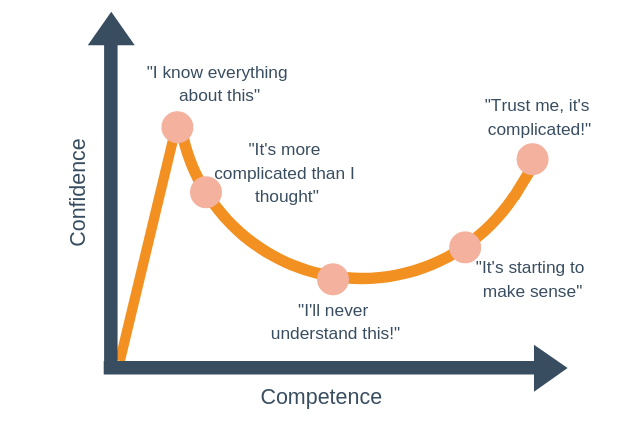A psycological phenomenon displayed and documented across every human population and demographic. The Dunning-Kruger effect is the inability to correctly judge one's compotence at a certain skill or trait. We've all met the self proclaimed genius with no fact to back the claim. Awareness of this minor human flaw is paramount in self assessment, which is a key constituent of personal development.
Valid enough reasoning for making it my first article in the personal development section of this site. In this post, I'll explore and lay out the concept aswell as how it can be combated.
click for: CONTENTS OF DUNNING-KRUGER EFFECT
- What is the Dunning-Kruger effect
- Examples of the Dunning-Kruger effect
- How to mitigate the effect
What is the Dunning-Kruger effect
The Dunning-Kruger effect is described as:
"a cognitive bias whereby people with limited knowledge or competence in a given intellectual or social domain greatly overestimate their own knowledge or competence in that domain relative to objective criteria or to the performance of their peers or of people in general." Brian Duignan, Britannica
In short, it is quite common for humans to be blind to their own personal weaknesses - though it may be very apparent to all those around them.
It's like that friend who now wants to drive your car after just 3 driving lessons. More than likely, they just don’t have enough driving knowledge to realize how bad they truly are. (Nicely, point out that there's a great difference between just moving a car and actually driving it!).
Individuals are unaware of their defeciences and thus assume that they are not deficient!
The same idea is expressed in the saying "A little knowledge is a dangerous thing" or by Charles Darwin, who stated “Ignorance more frequently begets confidence than does knowledge".
The Dunning-Kruger effect is not a thing of one being ignorant or having low intelligence, but rather being misinformed. The graph below depicts this perfectly. Once more knowledge/information is acquired, a person will begin to graspe how grand the matter truly is.

Examples of the Dunning-Kruger effect
There are many examples of the Dunning-Kruger effect in real life. No one is exempt and you could probably relate with one or more.
It is well known that amateur chess players often over estimate their ability at the game whilst experienced players are well aware of their high compotence but appreciate the vast room there still is for improvement. The D grade students who audaciously expect A's and B's whilst their "more able" classmates are more accutate in their predictions of grades. It is also seen in new singers, artists, drivers and researchers.
I've experienced this unfortunately in my journey through crypto, where in the first two weeks I spent the best part of my days researching and gaining knowledge rapidly, thinking, at the end of the fortnight, that I was clued up and ready to make my millions. Talking down on crypto n00bs as though I were some crypto sensei.
It took me a month aswell as a bear market to realise I was clueless and the more I dug the more I dicovered there was to learn. Stumped at the ordeal, I contemplated Cmd + Q'ing or Alt + F4'ing the whole crypto journey (quiting, if you didn't catch that). But I actually flipped the script and used the Dunning-Kruger graph to find solace. I knew that if I stuck to it long enough, I would begin to see some progress. And that I did, after all, the only way to eat an elephant is... one bite at a time!
How to mitigate the effect
When addressing the Dunning-Kruger effect, it is key to understand that anyone can be affected and that's nothing to be ashamed of. There will always be areas where knowledge is lagging despite being adept in other regions.
Find below some apporaches that would help you avoid the illusionary effect.
- Accepting criticism: if your intelligence is questioned in any scenario, as opposed to becoming offended, take on the critism and attempt to work on these areas - note them down for later reflections.
- Thinking before jumping to conclusions: before you reach any conclusion, take a minute to consider your ability or knowledge. Think of it in a pessimistic or worst case manner to limit inflated perceptions.
- Constantly question your knowledge: always challenge yourself and your thought processes. You could realise how wrong you are about something.
We're (literally) all in this together!



